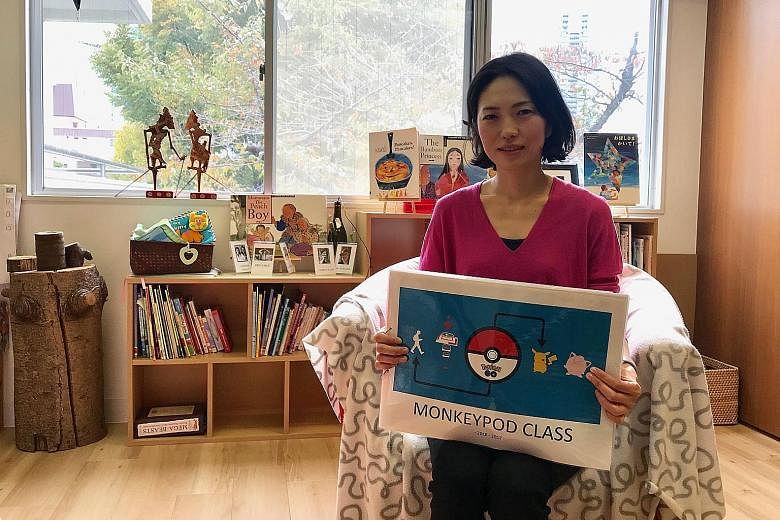International pre-school operators that also offer after-school daycare services are becoming increasingly popular in Japan, with parents wanting their children to pick up English at a young age, and spurred by a dire crunch in nursery school places.
Preschool Navi, a leading online resource of international pre-schools in Japan, estimates that there are about 1,200 centres nationwide, double the figure in 2014.
And this is set to grow, said Ms Khoo Kiewai from the Japan External Trade Organisation (Jetro), which helps foreign businesses enter the Japan market. She has observed a "noticeable increase" in the number of inquiries from businesses in recent years.
Neither Jetro nor the government tracks the number of international pre-schools as many operate as private businesses outside the more strictly regulated public education system.
But many schools are now running at full capacity, including Singapore's EtonHouse, which opened a centre in Tokyo's Roppongi district in 2010 and now has an enrolment of 85 pupils.
Mr Tan Anli, operational director of EtonHouse Tokyo, told The Straits Times there are plans to launch three more schools over the next five years. The school's hands-on pedagogy, which focuses on building creativity and confidence among children, has also been gaining traction. This year, it began partnering the T-Site retail complex in Chiba prefecture, east of Tokyo, to run an off-site early childhood sensory programme that immerses children in music and art.
"We won't change our philosophy to match the market, but we want to change the market perspective of early childhood education," Mr Tan said.
As an example, EtonHouse Tokyo has tapped into games, such as Pokemon Go and Angry Birds, to not only teach English, but also the concept of categorisation and the physics of flight trajectories. Besides English and Japanese, the school offers Chinese as an elective, which means some children as young as five can converse in three languages.
All this appeals to the growing number of relatively well-heeled Japanese families who are enrolling their children at EtonHouse.
Among them is Mrs Eiko Yamaguchi, 37, the mother of Gen, six, and Mio, three. She is unfazed by school fees of more than two million yen (S$24,800) a year per child, and told ST the focus on English will be a "window to the world" for her children. She added that she preferred they learn to think out of the box, as opposed to the "traditional rigid forms of education centred on etiquette" in many public schools.
During his recent successful election campaign, Prime Minister Shinzo Abe made a pledge to provide "free early childhood education" for all children aged three to five by 2020, as part of a suite of new social security measures to invest in the next generation and to lift the burden of childcare expenses.
Last year, there were 3.07 million children in Japan aged between three and five.
But Tokyo later clarified it did not intend to include pupils enrolled in privately run pre-schools such as international schools. The ensuing uproar forced the central government to backtrack, and it is now reportedly mulling over subsidies of up to 25,700 yen a month - the average fees at a public pre-school - for a child attending these schools.
Many public pre-schools today also provide nursery services as childcare is an increasingly touchy issue in Japan, where the government wants young mothers to return to the workplace but is unable to provide enough nursery slots for their children.
Last year, an anonymous blog post that read "Nihon Shine!" (Die, Japan!) by an irate mother whose child was unable to secure a place in a daycare facility sparked a Parliament debate. Worsening the problem are the low wages earned by nursery teachers, and in October, entrepreneur Takafumi Horie sparked a firestorm when he tweeted: "It's a job anyone can do."
While the government had set a target of accommodating all children on wait lists at "authorised" daycare facilities by March 2018, it has had to push back this goal by three years to March 2021.
Ministry of Health, Labour and Welfare figures show that as of April, the number of children waiting for a place in a government-run childcare facility has grown 10.8 per cent from April last year to 26,081.
What this means is there is a sizeable market for global pre-school operators, amid what Preschool Navi describes as "a growing interest in English language education".
"Many parents are considering letting their children study abroad as early as in junior high, and with this comes the need to ensure children are 'less allergic' to English with early exposure," said a Preschool Navi spokesman. While global pre-schools are more expensive, he said the demand has been fuelled by smaller household sizes, meaning that "parents are willing to spend more on each child".
One of the latest entrants into the Tokyo market is Rise Global, an Irish pre-school educator with over 150 centres in 15 countries. It opened its first school in Japan last year in the upmarket Daikanyama neighbourhood off Shibuya. Chief financial officer Garrett Power, who is based in Singapore to drive the school's expansion in Asia, sees huge potential as Japan opens up.
"It is very important to knock down barriers and help children build up their confidence from young," he said, observing that while many locals can speak English, they hesitate to do so.

